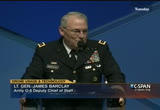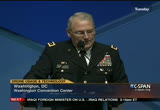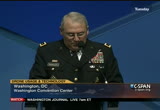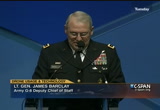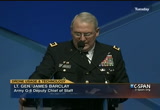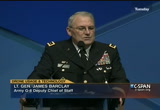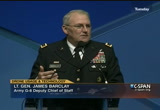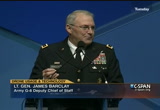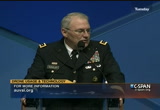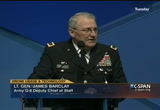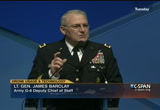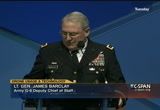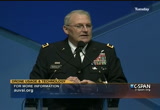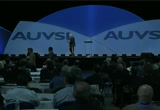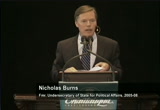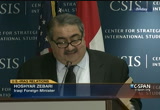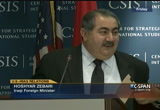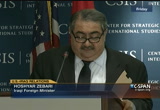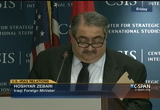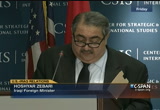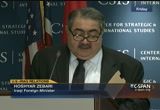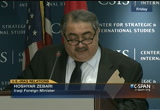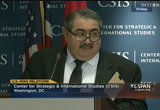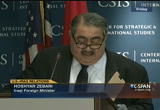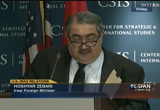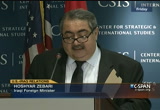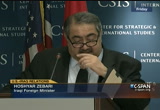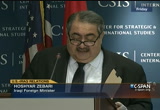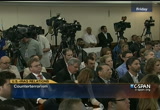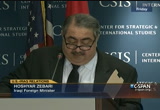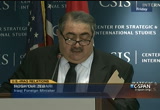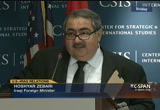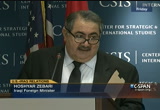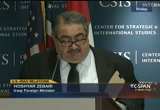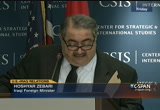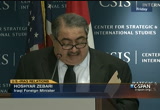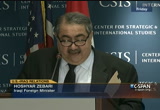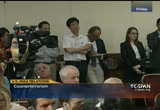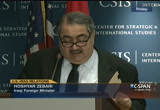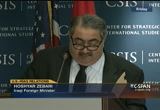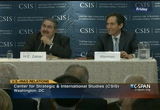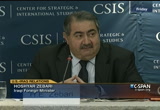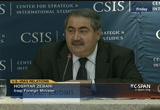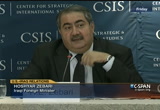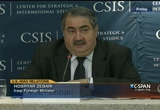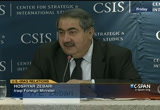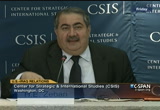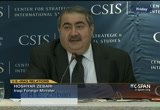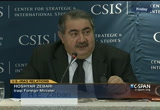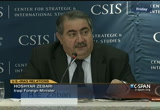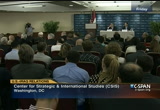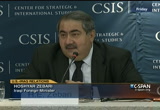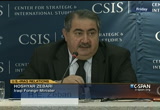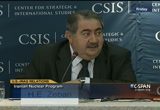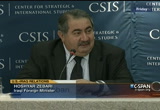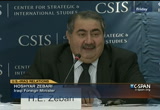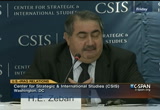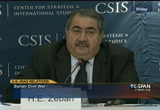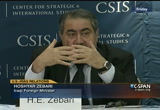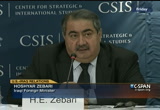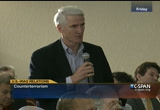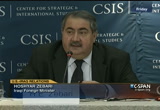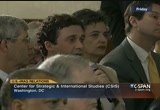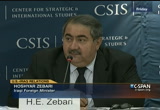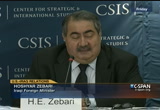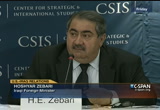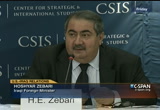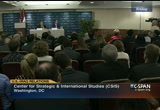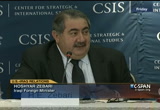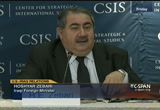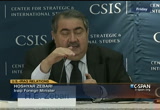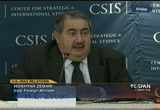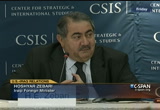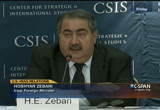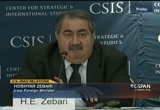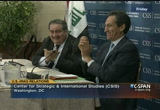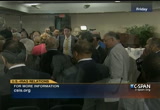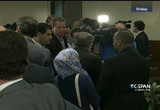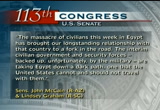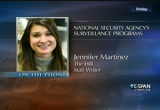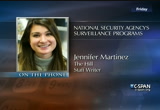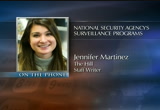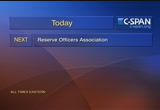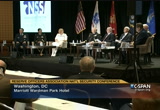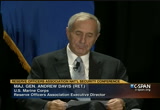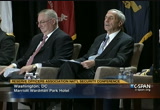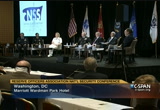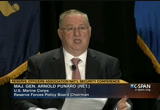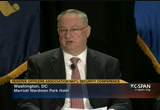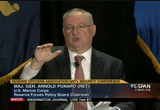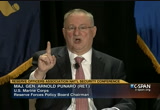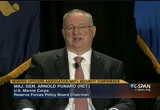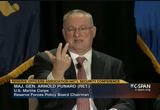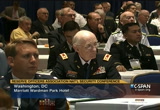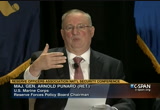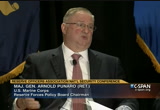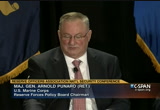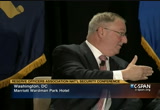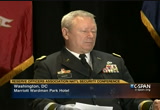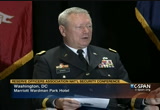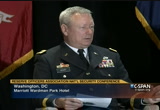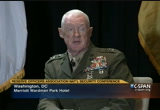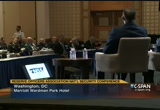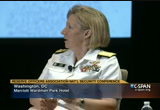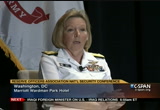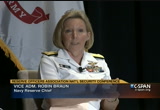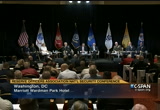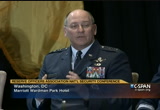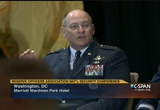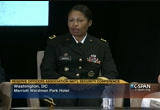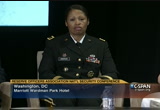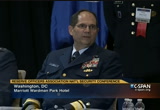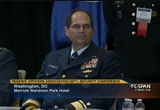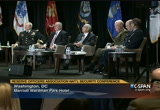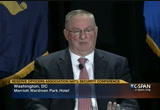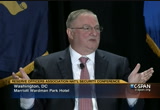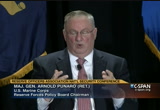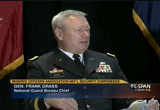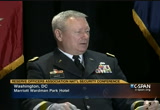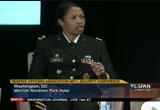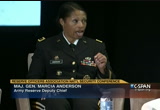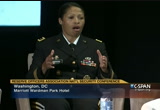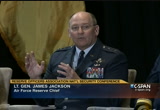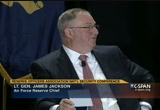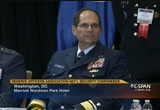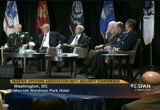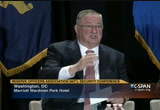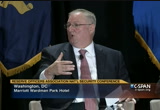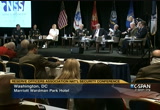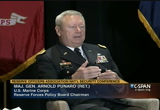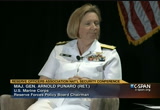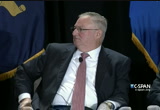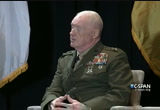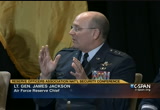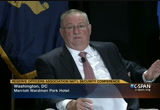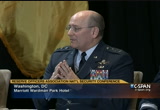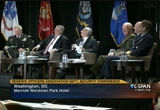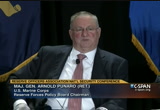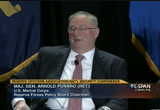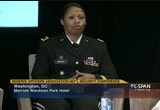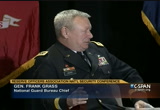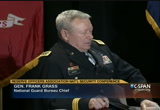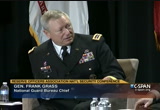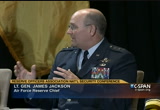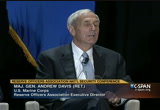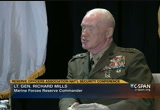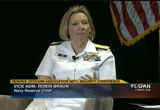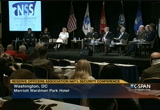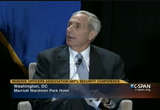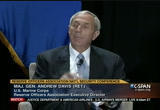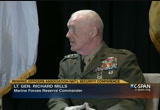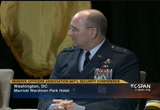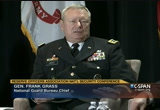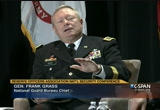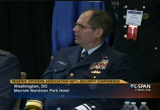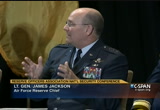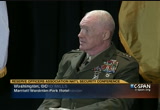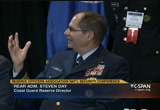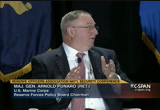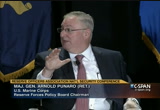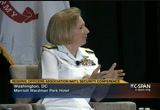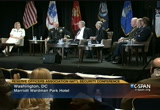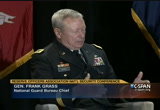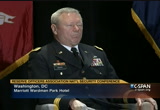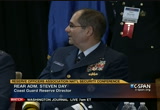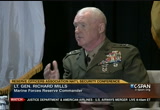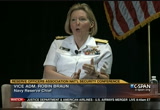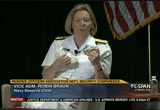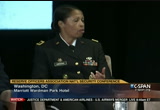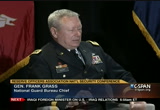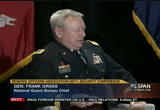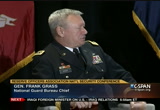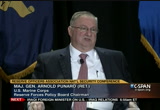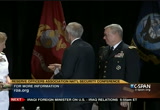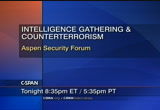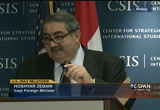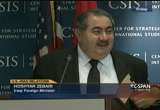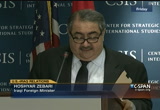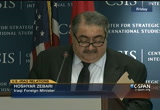tv Politics Public Policy Today CSPAN August 17, 2013 3:00am-6:01am EDT
3:00 am
5:00 am
>> i know he would want to jump in on that. same question to you, ac rc mix and operational nature of the army reserve? >> well, there's an extremely strong argument for the fact that we're concerned right now about whether or not we're going to assume risk by reducing the size our armed forces, and i think the counterpoint to that argument is by increasing your capability in the reserve component, you mitigate that isk significantly. many of the skills we need are in the reserve components, and
5:01 am
in some cases, they are perishable skills. the fighter pilots of the air force and in the army reserve, as i mentioned earlier, our logistics, engineers, medical capabilities -- those individuals not only have that military skill set but they bring with them innovation and other creativity from their civilian careers into those same jobs. a lot of the advances we saw in terms of medicine on the battlefield came from a lot of our military and our reserve doctorate. in order to mitigate the risks we might save by looking at the components, we need to look at the capabilities that currently exist in our reserve component. >> do you see a push away from the use of the army reserve capital we know the army guard
5:02 am
was offramp for some of the issions. to see a push coming in the building, either on the army side or somewhere else, that is pushing the army reserve back o the cold war strategic side? clocks there have been an offramp in many cases. cousin have civil affairs give the ability and specialized capabilities, there is still a demand from some of the commanders. i should probably thank senator levin but he has artie left --
5:03 am
but he has already left, it will enable the commanders to utilize reserve components, not for long durations, but for some of the short duration missions that they have. that'll fit very nicely. they might need a concentrated small capability to support security cooperation or some other partner building capacity. >> what is your take on these two issues, jj? >> we like three areas, the operational capability we bring every day. the comment there is we need to remain pure one ready. within the air force, it may be different between the services. we get program, planned, and trained that tier one level. currently it is about 5000 air force reserve members that directly report back commanders. the second part is that surge capacity. this is you have that surge capacity, in addition to that, why pay for something every single day and you can put it in a reserve component and have it only when you need it? we would like to put it in that type of approach. the third one has to do with that strategic capabilities. whether you're are talking
5:04 am
about the inactive reserve or about a conflict, that is a key requirement. we have to plan for that strategic requirement but have the capacity capability every single day. what it comes to the -- when it comes to the acrc mix, i am happy. using all 600,000 airmen, reset requirement, and see what we can use the reserve component to use. we are going to program with hat requirement. i am optimistic we are heading down that pathway. >> i should have mentioned, i think we have open-minded new leadership where we hopefully will not repeat the food fights that happened between the air uard and air reserve and active air force, which congress, and i spent 24 years
5:05 am
in the congress, all four committees, the two subcommittees, not just rejected the proposal, but soundly in a way i have not seen before. with general welch, he is a very thought all and objective individual. before we jumped the next area, would any of our leaders want to jump in on the -- on any of those. >> that was pretty unique. we do not have reserve units. we did away with them in 1995. we fully integrated with our active-duty force. both.
5:06 am
commanders -- both area commanders are very instrumental in making sure that that reserve force is ready. the commandant and i have talked about this. today i can show the, -- today i can show the,. we have forces ready to go out the door. we have a psu's in approximately 8000 of our 100,000 force. 301's are going to be going out the door soon to replace the unit down in gitmo. we will have the gitmo mission so long as we have prisoners down there. the more important thing is for us to be prepared and the ready to answer that call. we are very much integrated with the active-duty command. the plan for it and we are part of their plan over time. great. a question from the audience that i think is really very, very important and phrased this way. could you have a reserve force with half of the units operational and has to teach -- and have strategic? we need to understand, because there's a lot of myths about
5:07 am
readiness, and you've unfortunately seen that the readiness of all our units have been deteriorating under sequester. if you look at the active-duty force at any one time, and it is different for each service, for the most part a third of that force is operational probably either out in deployment, not in afghanistan -- out in afghanistan, wherever they are. hat one third is 100% on freedom's edge. the second is the units that are getting ready to do something. it may not be a deployment and their state of readiness maybe he take below the first third. and then a third at any one
5:08 am
time just got back from deployment. if you are an amphibious ready room and you just came back from a nine-month deployment, things are put into maintenance and no one expects that third to be ready to go read the notion that all of our active-duty forces are 100% ready every single day of the week, 365 days, we cannot afford it and that is just not the way it is. the issue for us on the reserve side is we do not propose to have 100% of our units operationally ready every day. what is the percentage? the hidden agenda here is when people talk about the strategic reserve created may be new leaders will think of it differently. when i think strategic deserve -- strategic reserve, i inc. of the early 80s where we had no equipment, no training, and no money. that is because in the peak of the cold war a lot of reserves were going to have longer than 180 days to mobilize. it was a serious question to pose. with that background, could you
5:09 am
have a reserve force with half of the units operational and have to teach it? i am going to turn to you first. at any one point, leading up to nine -- to 9/11, the guard had 60,000 guard personnel doing something somewhere. even in the air force and marine corps, all of the marine corporal -- all of the reserve components were on active duty. i throw this out for the whole group. this issue of how much should be operational and how much should be strategic. when we say strategic, are we talking about a new definition of was strategic is? >> looking back in the 70s, 80s, and even into the 90s, the national guard, especially on the army side, we had separate brigades. we had divisional brigades. they were resourced at different levels. even though we trained and
5:10 am
resourced the enhanced for data for our support packages, which were short deployers and enablers, we gave them more resources. whether time he got down to hometown america, that was being bounced a bit. we held those others to a higher standard. the one third that was in the bottom all the time, usually it was our divisional units, you created a mindset that that is all they expect of us, that is where we are going to stay, and then we have 180 days to get ready to go. one of the best things the army did was adopt the rotation of the oxygen model. it has done so much for every functional area within the guard. not just with on that forces but all the enablers. everyone is in the cycle. i love that model. everybody does need a break.
5:11 am
my option is we continue in that cycle. find out what the right amount is for the different functions. >> i think there is absolutely more room for operational forces and then more strategic forces in the navy reserve. we see that was seabees involved in rotation, squadrons who are operational, and yet there needs to be room in the reserve for people who can only do 38 days per year. people who can do the 12 months, 12 weekends, and 14 days. that is basically all they can give because of their civilian job or family situation. they are trained and ready so that when we need them they can come and serve.
5:12 am
i do think there is room for both. there are so many different missions in the navy reserve. >> marcia, as chairwoman of our subcommittee, you are actually looking at that model in the continuing service. >> to echo, the predictability is important. i agree with admiral braun. you are going to have to have people who are ready to go at a moments notice. it is a practical matter in the first 60 days of the war fight, you are going to have people who are enablers and army reserve who are going to get there to prepare for the following forces. you are going to have to have some that are operational and more strategic. to your point, you are going to have to see people commit more time. we need to give them the opportunity to do that. i think that is where you're going to have to have -- we have to be smart about how we go about that. we need a mix to support it. >> john? >> i think it is a little narrowly focused to ask that the reserve components are the only ones that can be half-and-half. i think you have to look at it as a total service. i would submit that the active-duty could probably afford, with the downtime and
5:13 am
speed ratio, altogether the active duties and reserve and guards come up with a force that is rated to go at a moments notice and all of the different service core functions that we have. that helps recruiting and tension throughout the entire force. >> we are looking at the reserve in the event a major crisis picks up it being a egular tar -- a regular part of our rotational forces, in order to give us more keys -- more piece. we look at it as an operational force, lane directly into the support of a total force concept, involving peacetime and wartime.
5:14 am
all of our structures are getting smaller and the requirements -- you have to have a reserve that is ready, enabled, and trained to go out the door quickly. timelines will stretch out. it may be delayed or force that comes into a crisis. the timelines are relatively short overall. think you have to maintain an operational reserve. >> jj? >> just like i mentioned previously, that is why i do not like to use those terms. it too much baggage with them. we do the search capacity because we have to help and then we have strategic depth in the end of that. whether they participate only 48 days per year, we can benefit those ways. i think everyone has said the same thing, that there is a very temporal aspect of this. whether you get to the fight or whether it is raining on a
5:15 am
daily basis, errors opportunity for the force, but john said, to go ahead and have all three components. >> steve? >> when i was senior reserve officer for admiral parker, i proposed a reserve rotational concept. many of the units of the fellow chiefs are under. he was very enthralled with that. we're hoping we can institute that. if you take those 5000 forces of coast guard that are ready to go and break it up -- if his is your year you have to be on ground, which requires the command to have over the five-year period made them ready to go. >> one last question in this session. as i mentioned earlier, unfortunately we are stuck -- we are not going to give up fighting the sequester. that is on a bipartisan basis. that is the only way we are going to get out of it. no one is giving up. so far we do not have the votes.
5:16 am
we will keep working it. but us assume we are unfortunately stuck with these lower-level resources. what are we doing and what can we do on the rc side to tighten our belts a little bit? what missions might be candidates for either increased or decreased rc participation? i am going to hit jj and marcia up. the air reserve and the army reserve are caught up in some of these issues right now with he headquarters. jj, i will start with you. >> as i mentioned in my opening comments, you can see what is going on for at least the next two years. we are trying to put a stake in
5:17 am
the ground 42023, for a technology air force that can basically going to and in -- and how do we get there? we are trying to match that same thing. as we look through all of our missions, we are very diverse. we are in every single one of the air force active-duty service core functions. some of those are enclaves of excellence that did not even have the capability for a member to move up in the senior listed ranks or even senior officer ranks. we are trying to determine what is a good strategic type of capacity that we need to retain? do some of those need to be oved into a higher priority? >> before i turn it over, can we save money by merging the air force reserve and the air guard? >> no. [laughter] [applause] > thank you, mr. chairman. for clearing that up. in terms of looking at our structure, i do recognize that
5:18 am
we have some structure that needs to be repurposed. we are looking very closely at some of our street -- some of our training structure and assets. they are being fully utilized. we can find some savings in terms of structure. we also do not want to sacrifice our ability to be responsive to commanders and to any contingency requirements. box great. as i turn it back over to drew for more questions from the audience, obviously you can see we are very blessed to have these very talented, capable, and gauged leaders in a time of critical -- of critical decision-making in the department.
5:19 am
our next meeting is september 5. all of these leaders have been tremendous participants in all of our quarterly meetings. we have pumped out a lot of hard-hitting recommendation is to secretary hagel, a number of which have been adopted. we have an open meeting at september 5 in arlington. it is open to the public. we are going to have many of these same leaders participating. you're going to hear from the secretary of the army, the vice chairman. any of you interested of attending one of the sessions, we need input in the field. we are very fortunate because we are a statutory independent commission that reports directly into the secretary of defense. i think you have gathered from our conversation this morning, particularly our members, we are not shrinking violets on any subject. we call it as we see it. i think it's important for the people at the top of the decision-making chain, there is a thermal layer at the pentagon, and a lot of things that are happening at the deck plates never make it to the top. we want to make sure that secretary hagel and general dempsey and the admiral get the objective information they need to make some of these critical
5:20 am
decisions. thank you for your continued support of our reserve component. we look forward to your help. thank you for allowing us to be here. clucks a great discussion, so far. we have a number of questions from our members and attendees in this symposium. let me kick it off by continuing the question that the general offered up on the merger of the guard and reserve. we heard emphatically from general jackson and general anderson. >> it would have been hell know if i had answered. collects or may have been some efficiencies gained. we talked about that across the department of defense. he believed the guard and reserve both bring capabilities to the table. that is all i am going to say about it. >> i will refer to my boss.
5:21 am
[laughter] >> this next question is for general grant. ow do you handle this issue as an honest broker on the joint chiefs? as an adjunct question, is there any wisdom to the idea of rotating with a reserve officer? > i came into the job last september. one of the things the staff talked me about is you have to establish a position on combining the guard and reserve. i thought about it. i thought about everything. my first thought was we've got to stay tight. i think this decision is not for us here.
5:22 am
i think this decision is a political decision that has to be made. it comes up about every four or five years. in the past we have had seven reserve components for a reason. i am going to stay focused on keeping a strong component. e worked together as a team. >> how about the idea of otating? >> i think if you look to the future and you think about how we do business as a nation, the governors and what we do every day in support of the governors and states, we have made some minor changes that are pretty major when you look at how they impact our response capability with being able to use the eserve under 12 304 alpha.
5:23 am
and men's it to thinking that for the future. had you get the on the title of the to discussion? cap to bring that up if you're going to get there in the future. i think you would not have seven separate organizations. for all the people in this room, you each bring a different capability to the fight. a different way to get to you. all of that has to be de-conflicted if we are going to try to bring them into one. if we ever did, you would have
5:24 am
to rotate the position. it still would have to have both 10 and 32 authorities. ask if i may, we are looking at this. one of the good news of having to look at this are the components. both the outgoing secretary and the chief has said there is goodness in value and what all three components bring to the organization. that allows us to bring in other opportunities for mission set in discussions on statuses and things like that that allow us to work and those efficiencies. when i go over to the hilt, i tell the -- the hill, i tell them there's good news. when the air force part the air force, 1/3 of them, the guard and reserve did not. we have three appropriations that congress set to get us and we keep them qualified on the mobility air force side by using our appropriation to keep those folks ready.
5:25 am
we mitigated some of the effects of this draconian cut because we do have appropriations. if you combine that into two or one, you would not have been there. that's my closing comment on that. > general mills? >> during the earlier parts of the discussion, we talked about the potential for accessing ac service members into the rc as we have a reduction in ac forces. at the same time, we had a question from the audience about how do we manage the outflow from the reserves so that we can get rid of the nonperformers, those who are overweight or not progressing, not showing up for drill?
5:26 am
we all have those in our units. how do we pick the right people coming out of the ac to fill spots we open up from the outflow? >> i think we're going to enter a a really golden year of being able to handpick talented ndividuals who are leaving for whatever reason. they choose to go on to pursue other things. i think that we can really have a large talent pool coming in. the challenge will be to attract them and to make sure that they understand the importance of what the reserve component does, the good training they will be able to receive and the good leadership they will be receiving. i think the opportunity is there. we make an attractive lternative to what other
5:27 am
aspirations they may have. there has never been a pool of junior officers but everyone pulling rank that are so talented, so experience. it is going to be a shame. weird -- we are going to lose some of them off the active roles. we will be foolish. >> i agree. i think this is important to not do across the board equal cuts to the active and reserve component. i think this is a good time to see what we can move into ring them into the reserve component. think it is an very important to do that. there are people that say it the active cut 10% the rush of the cap the same. why get rid of those capabilities. let's keep them any part-time status and take advantage of the training they have had over
5:28 am
the past five or 10 years? >> if you keep the citizen airmen for life, you retain that half $1 million investment over the first 67 years of that training. wiper that away? it does not make a lot of sense. we cannot bring them and if we do not have the position to do it in. >> if you would also talk about ways we can streamline across us for getting rid of the deadwood? >> it will complicate matters by the fact we have over 30 different duty statuses. there have been a number of statuses that have said we need to reduce the number to as
5:29 am
little as six to provide the ability for people to move back and forth between airmen for life, sailor for life, soldier for life, it will be a bit more attractive to people. it can be difficult to travel from active to reserve components. the army is looking at it. they have some tools that are in place now. we can add to that discussion and be engaged with them and helping them find ways to shape those pools a little bit better. many are designed simply to help the unique skill set. as a reserve component we have an obligation to be engaged in that discussion and help our respective services come with really good tools. >> we have a number of members rom the association. we received russians about quality and availability of medical care -- questions about
5:30 am
quality and availability of medical care for service them. if you are or mobilized in the eserve, you are within a couple of the baser station -- base or station were closely tied to the military and medical system. when we are back in reserve stats, we are spread from alaska to puerto rico. often remote from either va or quality military medical care. then there is the added quality of suicide rates that it may contribute to. comments on improving, sustaining, building the quality of reserve medical care and medical readiness?
5:31 am
>> i would comment in family readiness. one of the lessons we learned was to have a good family eadiness officer at each location to steer them in the right direction whether it be for medicare or any the nations they had. now with the cutbacks, there is a propensity to say that many will be activated or doing as much. perhaps we can save money by cutting some of these programs. we have to resist that. in some ways, some of the units are going to have medical problems well into the future, things like that. it is an education process to ensure the community ensures how they will get that medical
5:32 am
are. >> how do we break that time and distance? >> one of the things we're dealing with in the air force is standing up a case management cell in san antonio. for the last 24 months, we have been working this issue to say how do we get care of title 10 and title 30 numbers that have to have continuing service? who will take care of the individual member when they go back to another location? we came to the inclusion that we need to keep this. some kind of reach out and touch. >> we are not there yet. we have it only to about 50%. that is the solution we have come up with. >> any other comments? >> one of the other things that oncerns me, suicides are tremendous problem. it is an epidemic in our society.
5:33 am
there is a note this weekend. about 50% of the suicide of the military has never deployed. it is a problem society has to to deal with. they are providing as some research money. we are going to look at how can we join forces using some of the assets and the volunteers that the doctors are providing and the health professionals. there is some opportunity. we have to get after that. as a hundred thousand come after this, they are coming back to our hometown. there will be medical professionals that have not dealt with this at the level we had to deal with it. we're going to have to use our armories to do that. this is the money that is drying up. that same money that we use for our soldier readiness processing has taken us to a level that are medical readiness has ever been.
5:34 am
how are we going to assist in that and all these competing demands? we have to get out there. part of this is the compensation discussion, what portion can we continue to afford across all counts? you talk about this all the time. every program that we sent up to the hill that you want to curtail, it is hard to sell that on the hill. he have to get after if you're going to maintain the military and strong all volunteer force. at some point our compensation, there is a study that says if e do not do anything, it defenses not change compensation, raise, benefits, more than likely if we don't, by 2021, 0% of the total
5:35 am
obligation will be going to salaries and compensation. >> we had a couple of questions about the new missions for the issions. a couple of examples where ciber in uav. what does each of the services being to prepare for these new attlefields in the future? >> we're looking at cyber. we had an exercise two weeks ago. there is a real interest in having this assigned to the cyber command. the other piece that will be an interesting one is the art. we see the arctic as an opportunity where during those times when we have our forces
5:36 am
up is to utilize the coast guardsmen that have the skill sets for up in the arctic. we're looking into into that point but nothing definitive. >> sign me up for that duty. >> i mentioned earlier we looked at out of our -- all of ur missions. cyber appears in the top 30 what we think would be a good fit. the discussion we had with the air force is how we are going to fill the requirement for ciber, -- cybercom. it makes sense to look at this. we talked about the past capability. the other position where looking at is this is going to be a specialized skill sets. there has to be on the cutting edge every day. as a civilian you can do that. why take that onto the deal when you do not have to? ? >> we're pushing to go ahead and build the structure. we built our first operational ciber group.
5:37 am
we're trying to to support that requirements. >> the already have ciber structure in the army reserve. those are some pretty perishable skill sets. if you do not exercise those on a daily basis, they can erode. this is ideally suited to have more cyber assets than that. there are things you do on your day-to-day professions i can only enhance the apability. >> i agree the reserve community has a lot of talent can apply to this challenge. yet to bring those folk on active service. there is a long training cycle. there is a balance there you have to strike. >> what about the kid with a ponytail and a garage?
5:38 am
>> i wish i had one. >> this is very attractive. there are a fuse -- few price i concerns. >> >> i had to get that haircut. >> i would say that in visiting the cyber guard exercise, and cyber command, washington guardsmen were there. they were the educators. they work for microsoft or they ork for the software companies. and my take away rom that experience. interested in what the competencies are that you need for this. he was our cyber guy. he said it those competencies and then we want to put those on what is the realistic thing
5:39 am
we can do with the six days of training. this is what we are really ooking at. >> we had a task force looking at that. the sergeant who is a great businessman and looking at the future, general mills makes an excellent point. you look at the amount of money and they train them up in all the services. let's say they serve six years active-duty and then they decide they do not want to be on active duty anymore. one of the thoughts i have charged them with is how do we do this? i guarantee you the microsoft and google's of the world are going to be able to pay them a
5:40 am
lot more than they're going to be able to make their year six through year 12 in the military. can we come up with a construct where we do as they said. we train them up. they get their time. they do what they are supposed to do. how do we structure some of our reserve components where they can come into those units, and this is another challenge in that it was mentioned that by general grant and others, we've got these incredibly talented youngsters, n.c.o.'s that are going to leave. in the reserves, how do we get them in there? maybe we are going to have to not take as many non-prior service personnel. maybe we will have to spend a little bit more time. to get the kind of talent we are going to be paying for it would be a great disservice to the taxpayers to let them leave
5:41 am
this all together and not have an opportunity to continue serve. we will not point out any particular units. i know in the marine corps reserve, if they want to have purple hair during the week, as long as they get it cut high and tight when they come on drill, we're ok with that, right? >> we actually had short hair wig in the 1907's. > maybe in some units. >> i was going to say, with cyber, we programmed about 700 villas over the setup for cyber. because of the growth component, the throughput is not there. we do not have the capacity. we are looking at how to mitigate that right now. there is such a huge demand.
5:42 am
we need to grow that capability. we are also looking at unmanned systems. right now the challenge for us is because of sequestration in the budget challenges. we're not sure when those systems are going to actually come online. it is tough to program when he do not know if you're going to have to push that program another two or three years. it is exciting when you look at the potential. we are working on it. at this point we cannot really say how soon it will come online. >> there is room for everybody on this one. i was at the guard exercise we participate in every year. we have active guard reserve. we had d.h.s., fema participating, department of energy, department of transportation, public-private partnerships were there.
5:43 am
since you cannot determine where the problem resides, you have to have all those partners. what we talked about from the perspective is the governors are very interested. he would like us maintain the authorities we have so that state government can do some things. we have some of our warriors going out and doing folder vulnerability assessments on state mggets. because if something pops in the state, you still have to function, even though it may be dot-gov n dot-com or that we're dealing with. we keep to capability to work. i do think across all, if i think about the active component, every weapon system we will need to have this. these are talking about what is going to come out.
5:44 am
there will be capabilities. then you have the national and international piece of that. we have 12 units in the guard. some of them are arty working cyber network. they are scattered across the states. most of them reside close to major metropolitan areas that have the skill sets. they are doing very well. we want to look at how the air force and army are going to create the doctrine for the future, the structure in training. whatever we put in, this has to look like the service. it's got to be trained and certified for that service, so we can take anything from a state mission from the guard all the way to the federal side. >> we have a hard stop in five minutes. i would like to talk to each of you a tough question. it was brought up by senator
5:45 am
levin, and then we'll turn it over to general punaro for the last word, and that is the sexual misconduct issue. what is each of your services doing to address that? >> priorities. absolutely reinforce every flag meeting if needed. it is his top priority. that is his top priority. >> what are you doing on the drilling level? >> on the drilling level, again, we're integrated. we talked about the commander's responsibility t. goes through the areas, through the district commanders, right down to the field level. when you speak, he looks at all hands as reserved and active-duty. he make sure he is sharing the same expectations. culpability is taken into consideration. >> in this austere time, we are not doing this anywhere else.
5:46 am
we have shown maggie woodward is running that. the chief priority once again is to fix this. there are too many reports. and we will fix it. the air force, including us, took a stand down date to have that discussion and also pushed out. >> we had a standout around the marine core. every three-star had to go out and address all of his commanders listed. i flew down to texas to address the reserve component. we're stressing three things. first of all is a reemphasis on ethoso training, both in entry-level training and continuing to, again, listed officers to talk about expected conduct, the ethoos of being a
5:47 am
warrior and treating everybody with fairness and dignity. we are taking a hard look at being able to harden the target y getting this back in the barracks and getting supervision in places like hotels where they spend their team during drill weekends to ensure the proper level of supervision is there and that you ensure the folks that do harm are identified quickly and separated just as quickly. >> navy is doing the exact same thing as the marine corps. we are very much into where our sailors are on drill weekend and throughout the week. we found that about 50% of the report has to do with our alcohol, and so we're pushing a campaign of keep what you own, basically you don't keep the rank that you own. trying to curb the alcohol use and the incidents that we have, not only with sexual assault with alcohol involvement, but
5:48 am
also d.u.i.'s, all of the misconduct that comes with too much alcohol. we had done a number of stand downs. when this last round directed, i think everybody really has the opportunity to realize this is my responsibility. every sailor knows it is their responsibility to help turn this around. every commander knows it is their responsibility to help fix this. i think we have finally gotten it down to the individual level to say not in my navy, not in my service. do think that alcohol is such a big factor in this. we really have to continue to push that responsible drinking is important if they are going
5:49 am
to do that. that is really where the navy is right now. i do think the opportunity to get out into hotels is ood. the good thick, i think, we're seeing increased reporting of events that happened years ago, months ago and years ago. i think that shows that people are feeling more comfortable standing up and reporting what has happened. so there's a lot of that past incident reporting right now. >> general anderson, army? >> the armies doing much the the same thing as the other services. there is a lot of enhanced tools out on our website that are devoted to this for leaders from the various senior level all the way down to the attachment level that can utilize in their units. it is definitely the general's
5:50 am
top priority. to speak to your point, admirable, the increased emphasis at our training locations, our schools, for our young soldiers, and our old soldiers as well, we're all members of a team, we have to respect one another. if you see something, you need to say something. that also speaks to the increased reporting. people need to feel comfortable and whether they have been a victim or know something is going on, they have a responsibility to report it. >> national guard? >> a few months ago the president called all the joint chiefs and with the secretaries to talk about this problem. he wanted to understand it. and what help could he provide to tackle this and put his focus on it? since that time secretary hagel meet once a week with all these services. he has a series of ctirs that he looks at.
5:51 am
he expects all of us to be working below that level. it is a top priority. what we have done is we have taken two hours out of every conference that we have now, and we do it once a quarter, and we bring in experts from the field to talk about the problem within the society, to talk about how it translates to our guard men and women, and then also what is happening within the court system and how case ake an effective out of some? we have a stand down to all of the army guard, air guard, armories. we have to have those reports back that everyone has been recertified as recruiters, medical professionals, and that everyone has been briefed by the end of september we have to certify back. the hard part for us from the guard, and i'm not sure if the other reserve chiefs deal with the same issue, but the title
5:52 am
32 issue, whether they're on state active duty when something occurs, and there's no ucmj in that statement, we have to turn it over to local prosecutors. as the chairman said, if there's alcohol involved, a local prosecutor won't touch it. so we've got to keep it. we are pushing the states that do not have a top 32 to put it in place so we can prosecute. we have trained 71 special investigators so that if a prosecutor will not take it, we will send someone not even from that state or community out to do the investigation. and nothing else, we will go after it if we can prove the ase. we can administratively process for discharge. >> closing words? >> you've heard about a lot of headaches and positive opportunities, and here's the key -- each and every one of you here today in a
5:53 am
representative democracy of this great nation can make a difference, both individually nd collectively. my colleague from the commission of the reserve, colonel don stock to come, who's keeping us honest, raise your issues through the chain of command. you also have the opportunity to speak to your elected representatives. the people in this country have always made a difference. if you do not speak out, if you are not engaged and you also have tremendous talent, the military leaders of our reserve, the finest group we have had in my 40 plus years of working these issues, they are carrying be fight every day in the building. they need your support and active engagement. if we do not want these things to go in the wrong direction,
5:54 am
each and every one of you can and should make a difference. so we thank you for being here. we thank you for giving us the opportunity to visit with you here this morning. don't be a stranger. let us hear from you. thank you very much. [applause] we have valuable things that are under the threshold. please hold your seats after i hand these out. we have some important notices that we need to post. general, thank you, sir, for doing this. >> general anderson. >> why is that bigger? >> it is not a tiffany's box. come on, army, let's go. general, you recognize the uniform, right? all right. thank you, sir. >> thank you.
5:55 am
why don't you guys get it ogether? > thank you. >> thank you. [applause] [captioning performed by national captioning institute] [captions copyright national cable satellite corp. 2013] >> today, nicholas burns, former undersecretary of state for political affairs, discusses past and current diplomatic efforts and foreign policy issues. hat's at 10:00 a.m. eastern. current and former directors of the national counterterrorism center discuss threats, civil liberties, and data collection and surveillance. that's at 8:35 p.m. eastern, also here on c-span. >> secretary of state john
5:56 am
kerry at the state department thursday as part of a political and diplomatic joint coordination committee talks. the two countries agreed to boost cooperation to keep iran from flying weapons over iraq. friday, the ministers talked about iran, syria, and u.s.-iraq relations at the center for strategic and international [applause] thanklcome to all of you. you so much for your great introduction. thank you, john, also for him csis.ng us to the
5:57 am
i have worked with all of you and i'm honored to be here today on this friday. i am honored this could be the last lecture here in this building. theve the honored to have before it moves to another building. being honest and frank with you, i would devote most of my time --that question to duende q&a.
5:58 am
q&a. >> thank you. thank you so much for your great introduction. and thank you, john, also for inviting us to the csis. and with this distinguished crowd, i know many of you in person. i worked with some of you. i'm really honored to be among you today on its friday. i am honored also, this could be the last lecture here in this building, so i have to honor the csis before he moves to its new building. this is another honorary thing. thank you. i am here to offer a view from iraq and the region. being honest and frank with you, really i will devote most of my time to the questions to q and a rather than giving you a piece of -- want to hear from you. i know many of you have many serious questions about iraq's future and whether iraq has succeeded in the challenges or it has not. let me start -- much of what is happening today now in the middle east, and the issue in cairo, in the issue of beirut, syria, baghdad, terrorist attacks -- really they are in many ways related. the challenges and the opportunities and the tragedies have been taking place in iraq for the past decade. iraq was the third country in our region to make the-- was the first country in our region to make thetransition from dictatorship to democracy. we know that the road is long and hard and has been very arduous, torturous for us to make that transformation. but still worth taking.
5:59 am
as the arab spring have shown, countries that are governed through transitions are at risk of foreign intervention and domestic violence. in iraq, we are confronting these challenges and more. but we are also making progress towards stabilization, stabilizing our society, growing our economy, building our democracy, and developing good relations with all of our neighbors. 10 years after the rule of saddam hussein, the better future that we seek is still a goal, not a given. but some confusions are as clear -- some conclusions are as clearas anything can be in our region and in this time. for all the suffering we have endured, the people of iraq and
6:00 am
our neighbors are much better off now that saddam is gone. --write these are forever iraqis are forevergrateful to the sacrifices that americans have made in time, treasure, and of in blood. iraqis of course have endured even greater losses. and as the recent attacks of terrorism have reminded us -- our ordeal is not over. --e iraqi and our government the iraqi people and our governmentintend to redeem these losses by building a future worthy of our sacrifices. after decades of dictatorship, three disastrous wars, international isolation, economic sanctions, the displacement of more than one million iraq is, and the deaths -- one million
52 Views
IN COLLECTIONS
CSPAN Television Archive
Television Archive  Television Archive News Search Service
Television Archive News Search Service 
Uploaded by TV Archive on

 Live Music Archive
Live Music Archive Librivox Free Audio
Librivox Free Audio Metropolitan Museum
Metropolitan Museum Cleveland Museum of Art
Cleveland Museum of Art Internet Arcade
Internet Arcade Console Living Room
Console Living Room Books to Borrow
Books to Borrow Open Library
Open Library TV News
TV News Understanding 9/11
Understanding 9/11